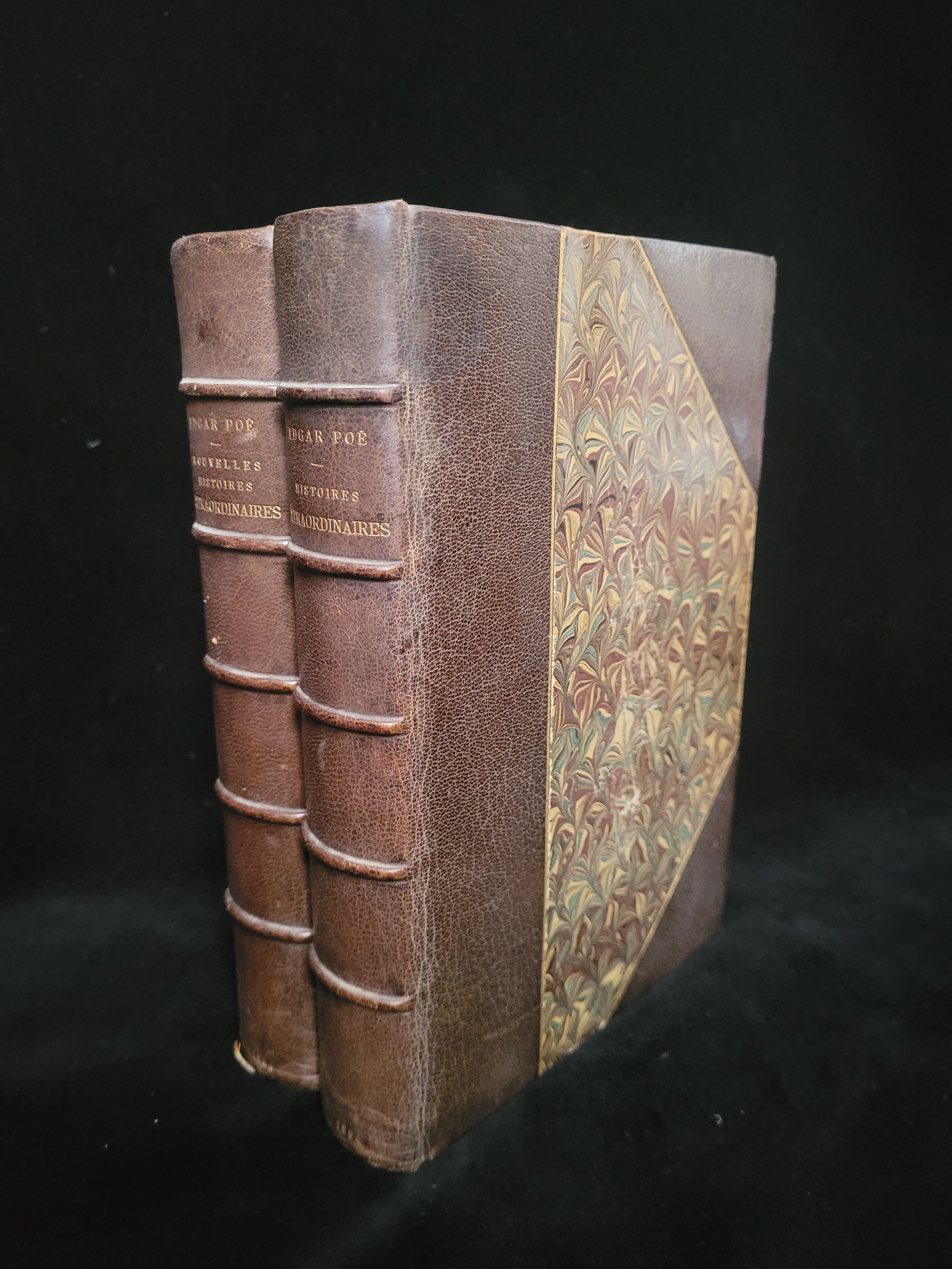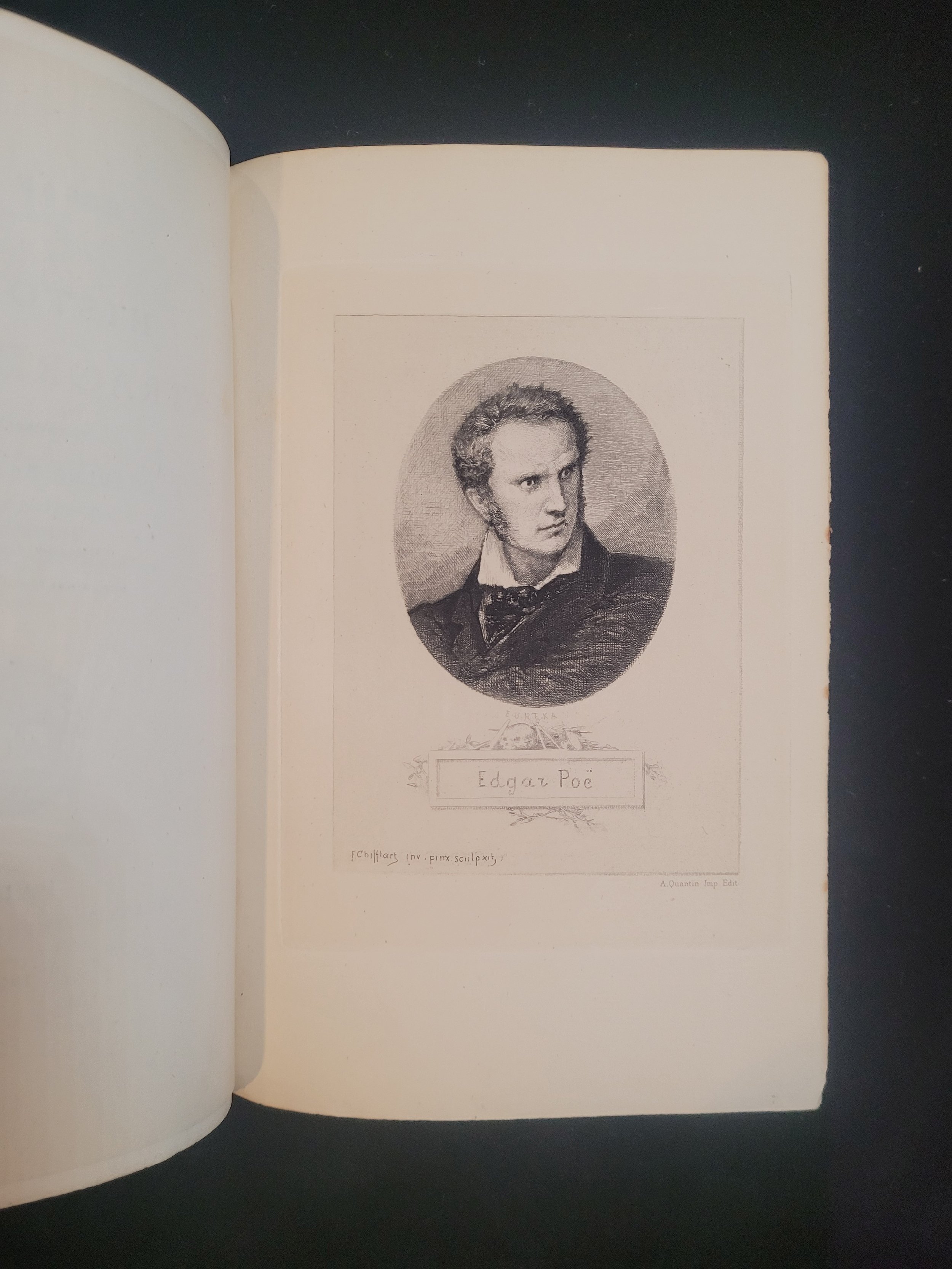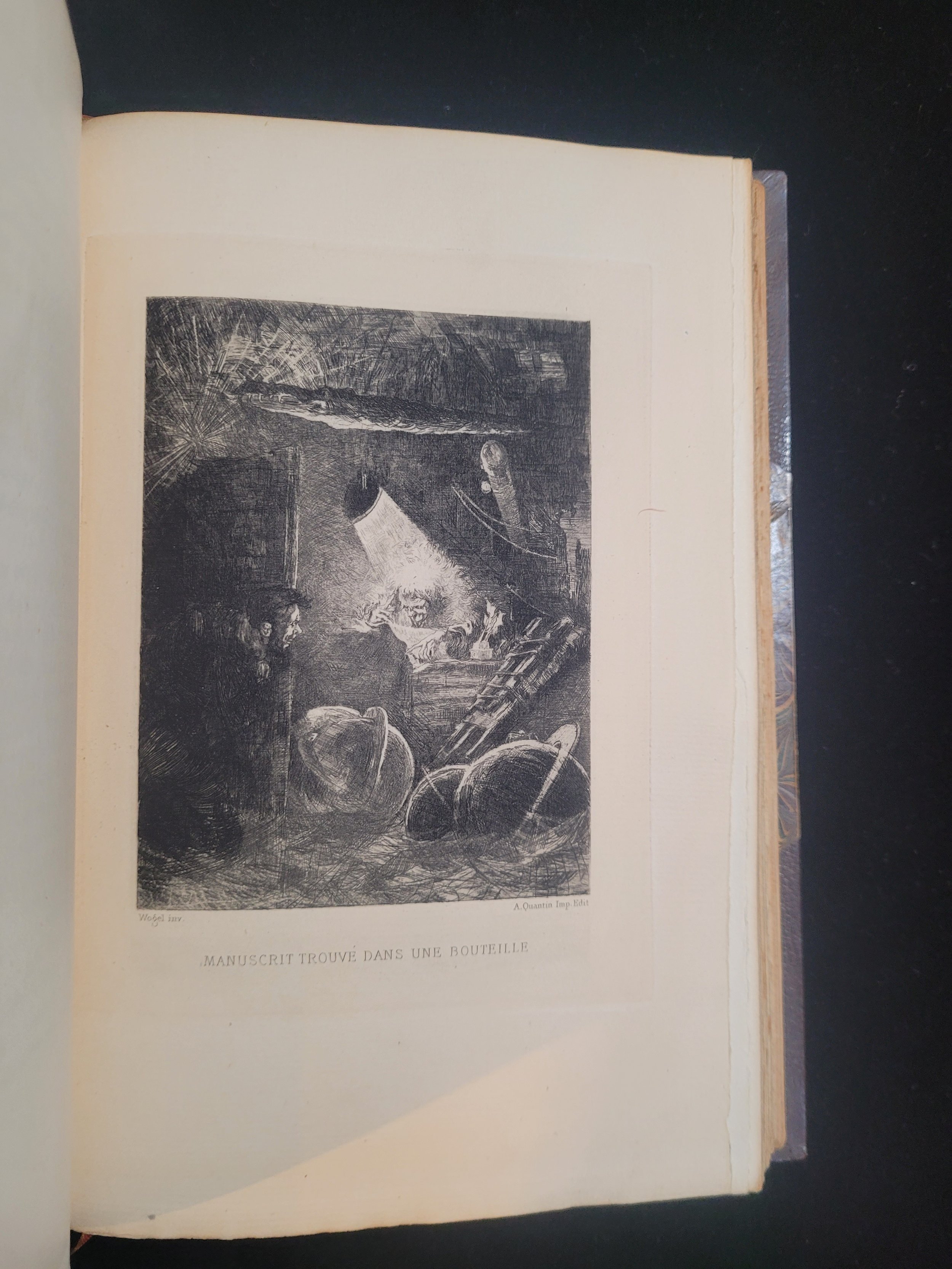 Image 1 of 3
Image 1 of 3

 Image 2 of 3
Image 2 of 3

 Image 3 of 3
Image 3 of 3




Histoires Extraordinaires [&] Nouvelles Histoires Extraordinaires.
POE, Edgar [Allen]
Histoires Extraordinaires [&] Nouvelles Histoires Extraordinaires.
Paris: A. Quantin. Imprimeur-Éditeur, 1884
8vo., 2 vols; finely bound by J. Foulquier Rel., in half brown morocco over marbled boards; lined in gilt; with five raised bands to spine, lettered directly in gilt with date to foot; upper edge gilt, else untrimmed; marbled endpapers; ribbon markers to each volume; pp. [xix], x-xxxii, [iii], 4-382, [vi]; [xiii], ii-xix, [iv], 4-410, [viii]; with decorative engraved half title, title page in black and red; and a further twenty six engravings behind mounted tissue guards; both volumes in very good condition, the bindings a touch rubbed at extremities, with some mild compression to spine tips; the text block lightly spotted to the fore-edge, with light spots, marks, and browning throughout, for the most part clean; a slightly larger brown stain in Vol II, encroaching from the half title to the title page along the lower edge.
First editions thus, translated into the French by Charles Baudelaire, and with a wonderful suite of plates by various artists including Wögel, Herpin, Férat, and a portrait of Poe by Chifflart.
A collection of 44 of Edgar Allen Poe’s most important stories, including amongst them The Black Cat, The Fall of the House of Usher, The Pit and the Pendulum and The Masque of the Red Death. It was Baudelaire who took it upon himself to translate Poe’s tales, publishing a series of critical essays that would launch Poe’s global career outside of the American market. In fact, as Paul Valéry claimed, Poe "'would today be completely forgotten if Baudelaire had not taken up the task of introducing him into European literature.” Echoes of the influence Poe had on Baudelaire is evident in such work as Les Fleurs de Mal (1857) which was written simultaneously with the first appearance of these translations between 1852 and 1865.
“In Edgar Poe there is no tiresome sniveling”, Baudelaire wrote, “but everywhere and at all times an indefatiguable enthusiasm in seeking the ideal.”
A lovely set.
POE, Edgar [Allen]
Histoires Extraordinaires [&] Nouvelles Histoires Extraordinaires.
Paris: A. Quantin. Imprimeur-Éditeur, 1884
8vo., 2 vols; finely bound by J. Foulquier Rel., in half brown morocco over marbled boards; lined in gilt; with five raised bands to spine, lettered directly in gilt with date to foot; upper edge gilt, else untrimmed; marbled endpapers; ribbon markers to each volume; pp. [xix], x-xxxii, [iii], 4-382, [vi]; [xiii], ii-xix, [iv], 4-410, [viii]; with decorative engraved half title, title page in black and red; and a further twenty six engravings behind mounted tissue guards; both volumes in very good condition, the bindings a touch rubbed at extremities, with some mild compression to spine tips; the text block lightly spotted to the fore-edge, with light spots, marks, and browning throughout, for the most part clean; a slightly larger brown stain in Vol II, encroaching from the half title to the title page along the lower edge.
First editions thus, translated into the French by Charles Baudelaire, and with a wonderful suite of plates by various artists including Wögel, Herpin, Férat, and a portrait of Poe by Chifflart.
A collection of 44 of Edgar Allen Poe’s most important stories, including amongst them The Black Cat, The Fall of the House of Usher, The Pit and the Pendulum and The Masque of the Red Death. It was Baudelaire who took it upon himself to translate Poe’s tales, publishing a series of critical essays that would launch Poe’s global career outside of the American market. In fact, as Paul Valéry claimed, Poe "'would today be completely forgotten if Baudelaire had not taken up the task of introducing him into European literature.” Echoes of the influence Poe had on Baudelaire is evident in such work as Les Fleurs de Mal (1857) which was written simultaneously with the first appearance of these translations between 1852 and 1865.
“In Edgar Poe there is no tiresome sniveling”, Baudelaire wrote, “but everywhere and at all times an indefatiguable enthusiasm in seeking the ideal.”
A lovely set.
POE, Edgar [Allen]
Histoires Extraordinaires [&] Nouvelles Histoires Extraordinaires.
Paris: A. Quantin. Imprimeur-Éditeur, 1884
8vo., 2 vols; finely bound by J. Foulquier Rel., in half brown morocco over marbled boards; lined in gilt; with five raised bands to spine, lettered directly in gilt with date to foot; upper edge gilt, else untrimmed; marbled endpapers; ribbon markers to each volume; pp. [xix], x-xxxii, [iii], 4-382, [vi]; [xiii], ii-xix, [iv], 4-410, [viii]; with decorative engraved half title, title page in black and red; and a further twenty six engravings behind mounted tissue guards; both volumes in very good condition, the bindings a touch rubbed at extremities, with some mild compression to spine tips; the text block lightly spotted to the fore-edge, with light spots, marks, and browning throughout, for the most part clean; a slightly larger brown stain in Vol II, encroaching from the half title to the title page along the lower edge.
First editions thus, translated into the French by Charles Baudelaire, and with a wonderful suite of plates by various artists including Wögel, Herpin, Férat, and a portrait of Poe by Chifflart.
A collection of 44 of Edgar Allen Poe’s most important stories, including amongst them The Black Cat, The Fall of the House of Usher, The Pit and the Pendulum and The Masque of the Red Death. It was Baudelaire who took it upon himself to translate Poe’s tales, publishing a series of critical essays that would launch Poe’s global career outside of the American market. In fact, as Paul Valéry claimed, Poe "'would today be completely forgotten if Baudelaire had not taken up the task of introducing him into European literature.” Echoes of the influence Poe had on Baudelaire is evident in such work as Les Fleurs de Mal (1857) which was written simultaneously with the first appearance of these translations between 1852 and 1865.
“In Edgar Poe there is no tiresome sniveling”, Baudelaire wrote, “but everywhere and at all times an indefatiguable enthusiasm in seeking the ideal.”
A lovely set.

